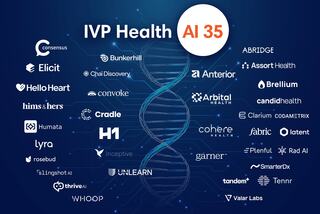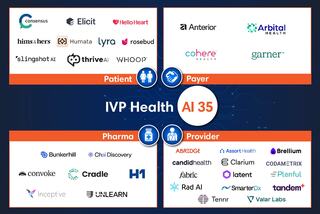Industry Insight
Health AI 35: What to know, who to watch

Generative AI has the potential to revolutionize health care. In an industry that generates so much data—and where so many tasks are still time-consuming and expensive—it can help automate workflows, create new insights and improve the quality of care.
But not all health AI companies are created equally.
The health care industry is a double-edged sword—hard for companies to break into but incredibly sticky once they do. That’s why we look for health AI companies that practitioners actually use, often because they have both a clear technological advantage and a unique go-to-market strategy.
While far from an exhaustive list, here are some of our favorite companies creating value for patients, providers, pharmaceutical companies and payers right now.
Patients - Establishing trust and improving care
The pandemic made everyone think more about their health, but a majority of Americans are still skeptical that artificial intelligence can actually make them healthier. That’s a challenge, but it’s also an opportunity for companies that can establish trust—including through endorsements by physicians and clinicians—and create a seamless, personalized consumer experience.
“With AI, we can bring the expertise of millions of providers to a single customer, rather than simply allowing one provider to reach more individuals. The potential for this level of personalized care is what we are the most excited about in this space.”
Hims & Hers
- AI-enabled hardware and medical devices - More and more consumers are getting comfortable using medical devices at home. Large language models (LLMs) can combine the biometric data collected by those devices with the latest medical knowledge to help predict disease and other health events in real-time. For example, IVP portfolio company Hello Heart combines a blood pressure monitor with AI to give patients a personalized plan for improving heart health.
- Academic search engines powered by AI - The internet is full of useful medical information, but most of it is far too dense for the average person to understand. Companies like Consensus and Elicit are democratizing medical knowledge by allowing consumers to ask medical questions in natural language and then responding with simple, clear answers linked to peer-reviewed publications.
- AI-native agents and coaches - AI chatbots are a new way for people to get personalized, science-based insights. In September 2023, IVP portfolio company WHOOP partnered with OpenAI to launch WHOOP Coach, which offers consumers tailored answers to health questions based on their unique biometric data and the latest medical research. Companies like Thrive AI, Rosebud and Slingshot AI are taking an AI first approach to mental health.
Providers - Reducing the administrative burden on healthcare workers
Today, physicians spend more than 40% of their time on manual administrative tasks — time they can’t spend providing patient care. Generative AI can help reduce that burden, but only if it focuses on the right workflow — one that’s ready for automation, where providers are willing to try something new and where a point solution could eventually become a platform.
“Clinicians today face tremendous pressure to see a growing number of patients with fewer resources. We’re working with innovative health systems to restore humanity to the health care experience. The remarkable outcomes and resoundingly positive feedback from clinicians underscore the profound impact of generative AI on the future of medicine. By alleviating cognitive load and creating space for more meaningful patient interactions, we will improve the lives of clinicians today.”
Dr. Shiv Rao, Abridge
- Workflow automation - To save physicians time, IVP portfolio company Abridge is automating patient notes and streamlining workflows that have traditionally been done by hand. Other workflows ripe for AI disruption include patient engagement and clinical decision making. Harnessing providers with comprehensive medical information at the point of care reduces research time; Hims & Hers built MedMatch to aggregate data and the knowledge of the medical community, helping providers deliver personalized care in an intelligent and informed way.
- Medical imaging - Companies like Rad AI are revolutionizing how radiologists operate by automating the reporting process via dictation. Others can analyze medical images with greater accuracy and speed than humans, and then communicate insights and flag outliers to providers.
- Coding - Most hospital systems are looking for two things: growth and efficiency. Medical coders analyze physician notes and lab results to assign correct diagnosis and procedure codes for insurance billing, yet coding errors cause U.S. hospitals to lose billions every year. SmarterDx and CodaMetrix are using AI to ensure that relevant information and diagnoses are accounted for, helping close a hospital system’s revenue integrity gap.
- Automating pharmacy operations - The 340B Drug Pricing Program helps hospitals serving vulnerable communities manage rising prescription drug costs. However, the program’s requirements are complex and mistakes can lead to financial penalties for physicians and pharmacies, which companies like Plenful guard against. Additionally, companies like Latent make the approval process easier by simplifying prior authorization and reducing prescription turnaround times.
Pharmaceutical companies - Making drug discovery faster and cheaper
Before pharmaceutical companies can test a new drug, they have to analyze enormous amounts of data to determine what might work. Generative AI can shorten development timelines by up to 75% and cut R&D spending in half — but only if companies focus on tasks and data that are ready to be structured and synthesized.
“Generative AI has the opportunity to vastly accelerate the time needed to discover and develop therapeutics such as antibodies, vaccines and peptides to cure many more diseases. Similarly to how generative image models allow creators to come up with novel pictures and videos, scientists can now generate improved versions of molecules or come up with completely new-to-nature molecules to solve harder problems.”
Stef van Grieken, Cradle Bio
- New drug development - Generative AI can make it easier for researchers to not only optimize drug candidates to find the right protein structure to maximize efficacy but also to design the correct drugs from scratch. This allows pharma companies to have shorter development cycles and get more effective candidates to clinical trials faster. Companies like Cradle Bio are speeding up development for protein engineering, which has the potential to transform the treatment of everything from the common flu to cancer.
- Enabling AI in the R&D process - To accelerate AI development, companies are bridging the gap between AI researchers and leading medical institutions. By overseeing FDA clearance processes and managing commercial sales, Bunkerhill Health shortens the timeline from research to practical application in healthcare.
Payers - Reducing the burden of regulation and costs
Every U.S. health plan has to comply with different rules and codes for every provider it works with—regulations that can change whenever Congress passes a new law. Generative AI can track these changes and help payers adjust in real-time. AI can also help payers in healthcare by automating and optimizing tasks like claims processing, fraud detection, and risk assessment.
The best solutions will not only offer seamless integration into existing workflows, but also prioritize data accuracy, scalability and the ability to adapt to future regulatory changes.
“AI has the potential to make health care more human – a concept that has captured my and many others' imaginations. AI can also make it simpler to access high-quality care - with quality measured based on outcomes that matter to patients. Health care delivery is in itself incredibly intimate and human and we are at the frontier of applications of AI - we should be humble about its benefits and limitations. AI is a complement, not substitute, and can always improve - as such applications benefit from appropriate human supervision in the day-to-day workflows.”
Azalea Kim MD, MBA, MPA Chief Product Officer, Accompany Health
- Prior authorization workflows - Prior authorization requires physicians to get insurance approval before they can prescribe a specific medication or deliver a certain type of care. It’s a labor-intensive and error-prone process with long lead times due to doctor and nurse shortages. Companies like Tandem Health and Cohere Health are speeding up the process, saving payers time and money.
- Enabling value-based care - More health plans are looking for providers who can prove they’re actually making patients healthier — but this value-based care can lead to complex risk contracts. Companies like Garner Health are helping health plans save money by incentivizing members to visit high-quality doctors and offering care navigation for self-funded employer plans.
“AI will create new opportunities to find correlations across massive datasets and truly understand how to drive improved health outcomes at scale. From personal, tailored medical plans to better utilization of real-world data in medical decision making, AI makes it easier for individuals to achieve better health through data insights. ”
Consumer health leader at Major tech company

Meet The Contributors

The leader in generative AI for clinical documentation

Primary, behavioral, and social care provider for low-income patients with complex needs

A global platform for the healthcare ecosystem

The best-in-class heart health digital therapeutics solution

A multi-specialty telehealth platform building a virtual front door for easy, convenient access to high-quality healthcare

The human performance company providing a membership for 24/7 coaching to improve health

